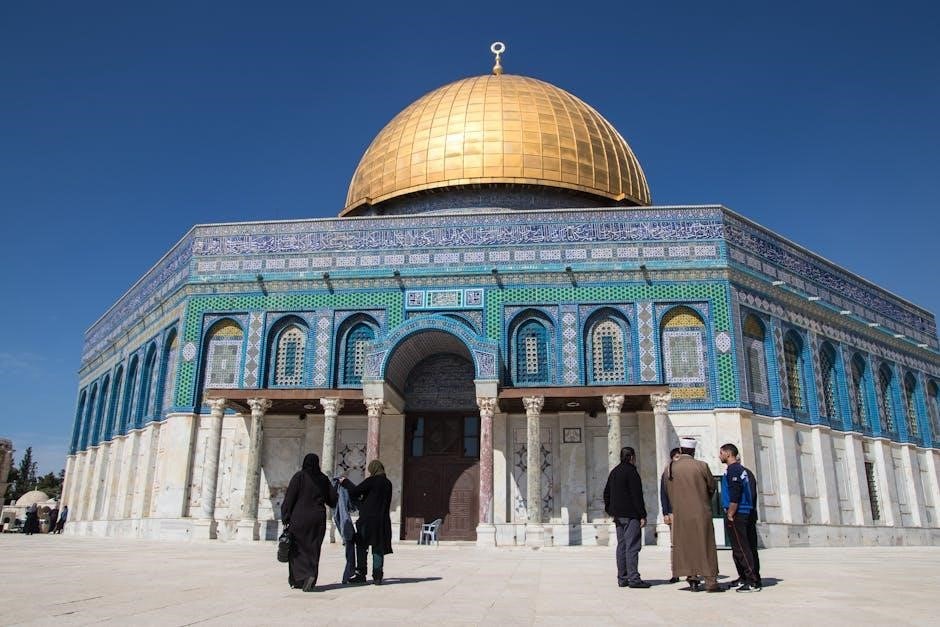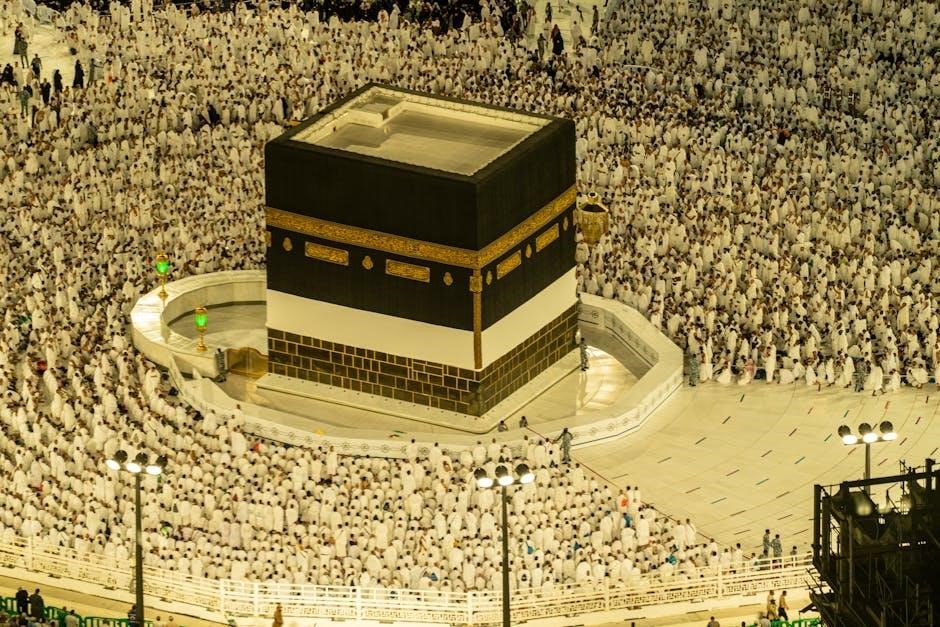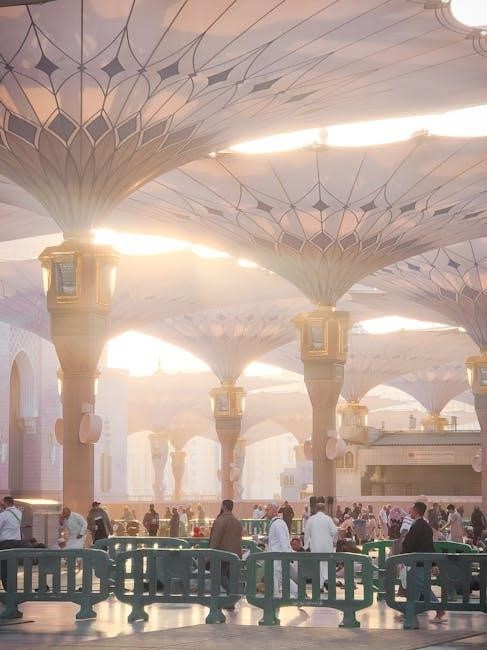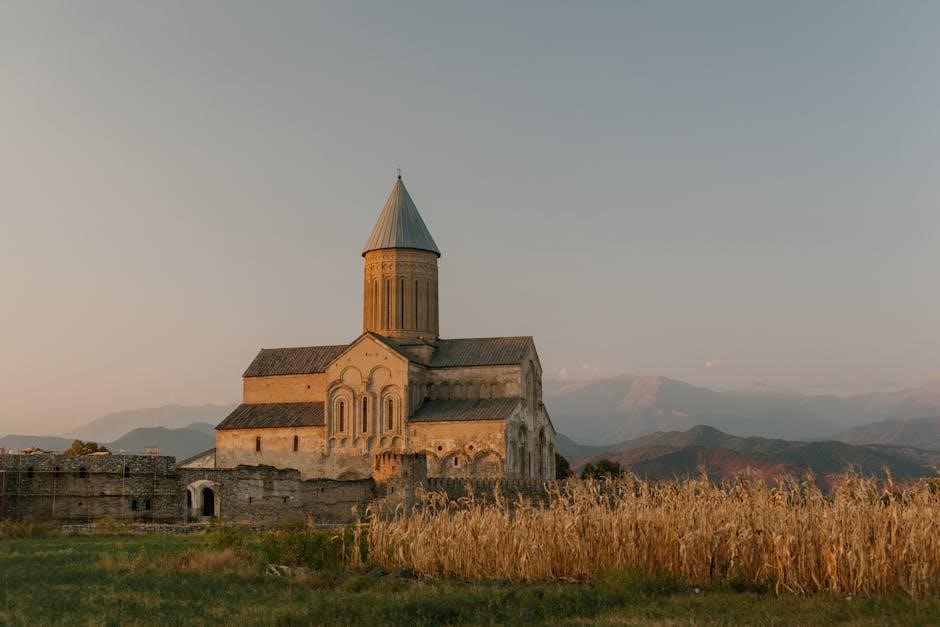The Significance of Pilgrimage (Hajj and Umrah) in Islam
Hajj, a pillar of Islam, and Umrah, a minor pilgrimage, hold profound spiritual significance. They represent a journey to seek Allah’s blessings, following the Prophet’s teachings. These pilgrimages unite Muslims globally, fostering equality and spiritual renewal.
Hajj as One of the Five Pillars of Islam
Hajj, the pilgrimage to Mecca, stands as one of the five fundamental pillars of Islam, holding immense significance for Muslims worldwide. It is a mandatory religious duty for every Muslim who is physically and financially capable, to perform at least once in their lifetime. Hajj embodies a profound act of submission to Allah, spiritual purification, and solidarity with the global Muslim community.
The pilgrimage involves a series of rituals performed in and around Mecca, following the traditions of Prophet Muhammad (PBUH). These rituals include Tawaf, Sa’i, standing on the Mount of Arafah, and stoning the devil, each carrying deep symbolic meaning and spiritual significance. By undertaking this journey, pilgrims seek forgiveness, mercy, and guidance from Allah, reinforcing their faith and commitment to Islam. Hajj serves as a reminder of the unity of the Muslim Ummah, transcending cultural and geographical boundaries, uniting believers in a shared act of worship.

Umrah as a Minor Pilgrimage
Umrah, often referred to as the “minor pilgrimage,” is a significant act of worship in Islam, distinct from the obligatory Hajj. Unlike Hajj, which occurs during specific dates, Umrah can be performed at any time of the year, offering flexibility for Muslims to undertake this spiritual journey. It involves visiting the House of Allah (SWT) in Mecca and performing specific rituals, rooted in the teachings of the Prophet Muhammad (PBUH).
Umrah is a profound act of devotion, allowing Muslims to strengthen their connection with Allah and seek His blessings. The rituals include Tawaf, circling the Kaaba, and Sa’i, walking between the hills of Safa and Marwa, commemorating Hagar’s search for water for her son Ishmael. While not obligatory like Hajj, Umrah holds immense spiritual value, offering an opportunity for purification, reflection, and renewal of faith. It allows pilgrims to experience the sacredness of Mecca and deepen their relationship with Allah.

The Spiritual Dimension of Pilgrimage
Pilgrimage, guided by Allah, transcends the physical journey. It embodies a profound spiritual quest. Pilgrims seek divine guidance, forgiveness, and purification, deepening their connection with Allah through devotion and reflection during sacred rituals.
Seeking Allah’s Guidance and Forgiveness
The cornerstone of Hajj and Umrah lies in the sincere aspiration to seek Allah’s divine guidance and forgiveness. Pilgrims embark on this sacred journey with hearts full of hope, seeking to cleanse themselves of past transgressions and draw closer to the Almighty. Standing on the plains of Arafah, they pour out their souls in heartfelt supplication, begging for mercy and direction.
This act of seeking forgiveness is not merely a ritualistic practice but a profound spiritual experience. Pilgrims reflect on their shortcomings, acknowledge their mistakes, and commit to living a life guided by Islamic principles. The journey becomes a transformative process, fostering humility, repentance, and a renewed sense of purpose. Through sincere repentance and devotion, pilgrims hope to attain Allah’s grace and secure His blessings for a righteous life, firmly guided by His divine wisdom.
Spiritual Purification and Renewal
Pilgrimage serves as a powerful means of spiritual purification and renewal, offering pilgrims a unique opportunity to cleanse their hearts and minds. By detaching themselves from worldly distractions and immersing themselves in acts of worship, they seek to purify their souls from negative influences and attachments.
The rituals of Hajj and Umrah, such as Tawaf and Sa’i, symbolize this process of purification, as pilgrims circumambulate the Kaaba and retrace the steps of Hagar, respectively. These acts of devotion serve as a reminder of their commitment to Allah and their desire to live a life of righteousness. The journey provides a fresh start, empowering them to break free from negative habits and embrace a renewed sense of purpose, guided by faith and devotion. This purification leads to a deeper connection with Allah.

Key Rituals and Practices During Pilgrimage
Pilgrims undertake several key rituals, guided by the Prophet’s Sunnah. These include Tawaf, circling the Kaaba, and standing on Arafah. These practices are essential for spiritual fulfillment, seeking Allah’s mercy, and guidance during the Hajj.
Tawaf and Supplications
Tawaf, the circumambulation of the Kaaba, is a central ritual during both Hajj and Umrah. Pilgrims circle the Kaaba seven times, reciting prayers and supplications. This act symbolizes the believer’s devotion to Allah and unity with the Muslim community. During Tawaf, pilgrims often touch or gesture towards the Black Stone, following the Prophet’s example.
Supplications, or Du’a, are an integral part of the pilgrimage. Throughout the journey, especially during Tawaf, pilgrims pour out their hearts to Allah, seeking forgiveness, guidance, and blessings. They express their gratitude, confess their shortcomings, and ask for strength to live according to Allah’s will. These heartfelt prayers reflect the pilgrim’s deep faith and trust in Allah’s mercy.
The combination of physical action and sincere supplication during Tawaf creates a powerful spiritual experience, fostering a closer connection with Allah.
Standing on the Mount of Mercy (Arafah)
Standing on the Mount of Mercy, or Arafah, is the pinnacle of the Hajj pilgrimage. On the ninth day of Dhul Hijjah, pilgrims gather on this plain, seeking Allah’s forgiveness and mercy. This day is considered the most important day of Hajj, as it is believed that Allah descends to the lowest heaven to shower blessings upon the pilgrims.
Pilgrims spend the day in prayer, reflection, and repentance, asking Allah for guidance and strength. They supplicate with utmost sincerity, acknowledging their sins and shortcomings. The atmosphere on Arafah is one of profound spirituality and humility, as pilgrims from all walks of life unite in their devotion to Allah.
Standing on Arafah is a powerful reminder of the Day of Judgment, when all humanity will stand before Allah. It is a time for pilgrims to purify their hearts and renew their commitment to living a life pleasing to Allah.

Practical Guidance for Pilgrims
Preparation is key for a fulfilling pilgrimage. Seek reliable guidance, understand rituals, and plan logistics meticulously. Spiritual readiness, coupled with practical steps, ensures a blessed journey guided by Allah’s grace.
Preparing for the Journey
Embarking on Hajj or Umrah requires meticulous preparation, both spiritually and practically. Begin with sincere repentance and seeking Allah’s forgiveness, purifying your intentions. Study the rituals thoroughly, understanding their significance and proper execution, guided by the Prophet’s teachings.
Financially, plan your expenses wisely, securing adequate funds for travel, accommodation, and sustenance. Choose a reputable tour operator offering comprehensive services and guidance throughout the pilgrimage. Physically, ensure you are in good health, consulting your doctor and obtaining necessary vaccinations.
Pack appropriately, including modest clothing adhering to Islamic guidelines, comfortable shoes for extensive walking, and essential medications. Gather necessary documents, such as passports, visas, and health records, ensuring their validity. Learn basic Arabic phrases for communication, enhancing your interaction with locals.
Most importantly, cultivate patience, humility, and a positive attitude, embracing the challenges and blessings of this transformative journey, seeking Allah’s guidance every step of the way.
Following the Prophet’s Teachings in Rituals
Performing Hajj and Umrah involves specific rituals, each carrying profound spiritual meaning. Adhering to the Prophet Muhammad’s (PBUH) teachings in performing these rituals is paramount, ensuring authenticity and acceptance by Allah. Begin with Ihram, declaring your intention and donning the prescribed attire, signifying purity and devotion.
During Tawaf, circumambulate the Kaaba seven times, reciting supplications and seeking closeness to Allah. Perform Sa’i, walking between Safa and Marwa, commemorating Hagar’s search for water and reflecting on Allah’s mercy. Stand on the Mount of Mercy at Arafah, supplicating and seeking forgiveness, acknowledging your sins and shortcomings.
At Muzdalifah, gather pebbles for the stoning of the Jamarat in Mina, symbolizing rejection of evil and commitment to righteousness. Offer sacrifice, commemorating Prophet Ibrahim’s willingness to sacrifice his son, demonstrating obedience to Allah’s command. Shave or trim your hair, signifying the completion of the pilgrimage and renewal of faith.
Throughout these rituals, maintain sincerity, humility, and mindfulness, reflecting on the spiritual significance and seeking Allah’s guidance.
